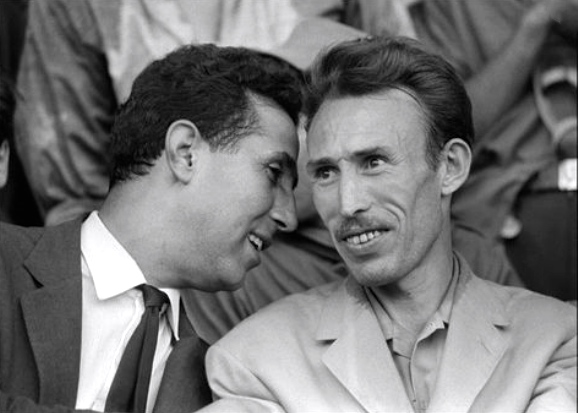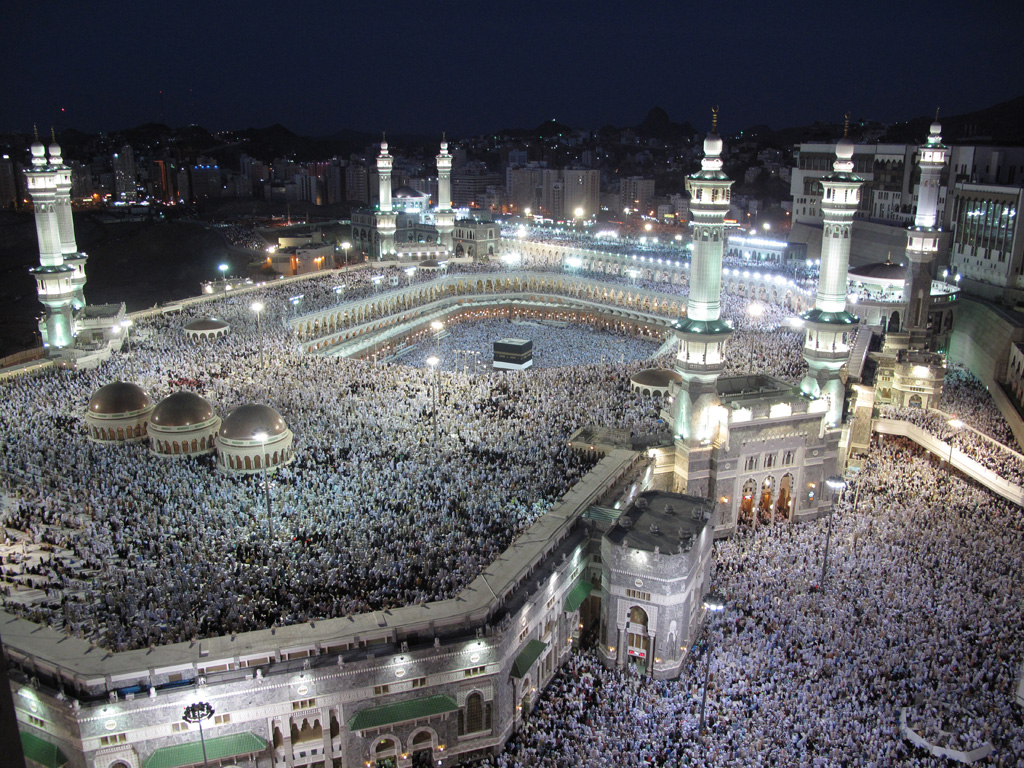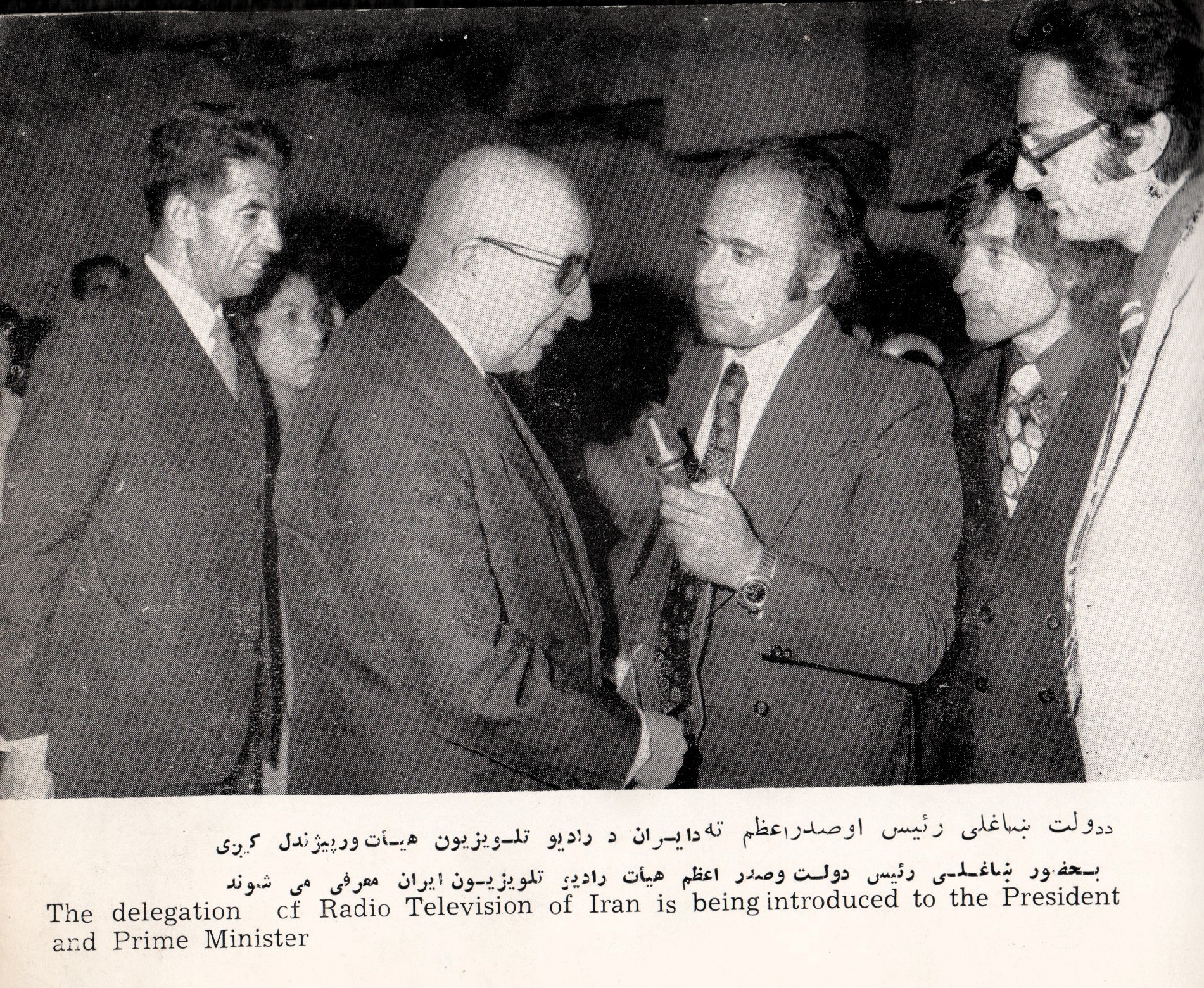|
King Abdulaziz Mosque (Riyadh)
King Abdulaziz Mosque (), is a historic Friday mosque in the al-Murabba neighborhood of Riyadh, Saudi Arabia, located next to the Murabba Palace compound and the National Museum Park in the King Abdulaziz Historical Center. Covering an area of 5540 square meters, it was first built around the 1940s, corresponding with the construction of Murabba Palace. The mosque held the funerary prayers for King Faisal bin Abdulaziz following his assassination in 1975 and was later rebuilt by the Royal Commission for Riyadh City in 1998. Overview The mosque was built in the 1940s during the reign of King Abdulaziz ibn Saud as part of the construction of the Murabba Palace and served as his place of worship until his death in 1953. In 1975, the mosque held the funerary prayers of King Faisal bin Abdulaziz following his assassination. The funeral was attended by several head of states such as Sheikh Zayed bin Sultan, Yasser Arafat, Hafez al-Assad, Idi Amin, Houari Boumediene, Ahmed Hassan a ... [...More Info...] [...Related Items...] OR: [Wikipedia] [Google] [Baidu] |
Sunni Islam
Sunni Islam is the largest Islamic schools and branches, branch of Islam and the largest religious denomination in the world. It holds that Muhammad did not appoint any Succession to Muhammad, successor and that his closest companion Abu Bakr () rightfully succeeded him as the caliph of the Muslim community, being appointed at the meeting of Saqifa. This contrasts with the Succession of ʿAlī (Shia Islam), Shia view, which holds that Muhammad appointed Ali, Ali ibn Abi Talib () as his successor. Nevertheless, Sunnis revere Ali, along with Abu Bakr, Umar () and Uthman () as 'Rashidun, rightly-guided caliphs'. The term means those who observe the , the practices of Muhammad. The Quran, together with hadith (especially the Six Books) and (scholarly consensus), form the basis of all Fiqh, traditional jurisprudence within Sunni Islam. Sharia legal rulings are derived from these basic sources, in conjunction with Istislah, consideration of Maslaha, public welfare and Istihsan, jur ... [...More Info...] [...Related Items...] OR: [Wikipedia] [Google] [Baidu] |
Houari Boumédiène
Houari Boumédiène (; born Mohammed ben Brahim Boukharouba; 23 August 1932 – 27 December 1978) was an Algerian military officer and politician who was the list of heads of state of Algeria, second head of state of independent Algeria from 1965 until his death in 1978. He served as Chairman of the Revolutionary Council (Algeria), Revolutionary Council of Algeria from 19 June 1965 until 12 December 1976 and thereafter as president of Algeria until his death. Born in Guelma, Mohammed ben Brahmin Boukharouba was educated at the Islamic Institute in Constantine. In 1955, He joined the National Liberation Front (Algeria), National Liberation Front (FLN) and adopted the Pseudonym, nom de guerre Houari Boumediene. By 1960, he had risen through the organization's ranks to become the commander of the FLN's military wing. After the FLN's victory over the French in the Algerian War of Independence in 1962, Boumediene became the Minister of Defense in Algeria's new government. However, in ... [...More Info...] [...Related Items...] OR: [Wikipedia] [Google] [Baidu] |
Mosques Completed In The 1940s
A mosque ( ), also called a masjid ( ), is a place of worship for Muslims. The term usually refers to a covered building, but can be any place where Islamic prayers are performed; such as an outdoor courtyard. Originally, mosques were simple places of prayer for the early Muslims, and may have been open spaces rather than elaborate buildings. In the first stage of Islamic architecture (650–750 CE), early mosques comprised open and closed covered spaces enclosed by walls, often with minarets, from which the Islamic call to prayer was issued on a daily basis. It is typical of mosque buildings to have a special ornamental niche (a ''mihrab'') set into the wall in the direction of the city of Mecca (the ''qibla''), which Muslims must face during prayer, as well as a facility for ritual cleansing (''wudu''). The pulpit (''minbar''), from which public sermons (''khutbah'') are delivered on the event of Friday prayer, was, in earlier times, characteristic of the central city mosque, ... [...More Info...] [...Related Items...] OR: [Wikipedia] [Google] [Baidu] |
Grand Mosques
Grand may refer to: People with the name * Grand (surname) * Grand L. Bush (born 1955), American actor Places * Grand, Oklahoma, USA * Grand, Vosges, village and commune in France with Gallo-Roman amphitheatre * Grand County (other), several places * Grand Geyser, Upper Geyser Basin of Yellowstone, USA * Le Grand, California, USA; census-designated place * Mount Grand, Brockville, New Zealand Arts, entertainment, and media * ''Grand'' (Erin McKeown album), 2003 * "Grand" (Kane Brown song), 2022 * ''Grand'' (Matt and Kim album), 2009 * ''Grand'' (magazine), a lifestyle magazine related to related to grandparents * ''Grand'' (TV series), American sitcom, 1990 * Grand Production, Serbian record label company Other uses * Great Recycling and Northern Development Canal, also known as GRAND Canal * Grand (slang), one thousand units of currency * Giant Radio Array for Neutrino Detection, also known as GRAND See also * * * Grand Hotel (other) * Grand stat ... [...More Info...] [...Related Items...] OR: [Wikipedia] [Google] [Baidu] |
Mosque Buildings With Minarets In Saudi Arabia
A mosque ( ), also called a masjid ( ), is a place of worship for Muslims. The term usually refers to a covered building, but can be any place where Islamic prayers are performed; such as an outdoor courtyard. Originally, mosques were simple places of prayer for the early Muslims, and may have been open spaces rather than elaborate buildings. In the first stage of Islamic architecture (650–750 CE), early mosques comprised open and closed covered spaces enclosed by walls, often with minarets, from which the Islamic call to prayer was issued on a daily basis. It is typical of mosque buildings to have a special ornamental niche (a ''mihrab'') set into the wall in the direction of the city of Mecca (the ''qibla''), which Muslims must face during prayer, as well as a facility for ritual cleansing (''wudu''). The pulpit (''minbar''), from which public sermons (''khutbah'') are delivered on the event of Friday prayer, was, in earlier times, characteristic of the central city mosque, ... [...More Info...] [...Related Items...] OR: [Wikipedia] [Google] [Baidu] |
Sunni Mosques In Saudi Arabia
Sunni Islam is the largest Islamic schools and branches, branch of Islam and the largest religious denomination in the world. It holds that Muhammad did not appoint any Succession to Muhammad, successor and that his closest companion Abu Bakr () rightfully succeeded him as the caliph of the Muslim community, being appointed at the meeting of Saqifa. This contrasts with the Succession of ʿAlī (Shia Islam), Shia view, which holds that Muhammad appointed Ali, Ali ibn Abi Talib () as his successor. Nevertheless, Sunnis revere Ali, along with Abu Bakr, Umar () and Uthman () as 'Rashidun, rightly-guided caliphs'. The term means those who observe the , the practices of Muhammad. The Quran, together with hadith (especially the Six Books) and (scholarly consensus), form the basis of all Fiqh, traditional jurisprudence within Sunni Islam. Sharia legal rulings are derived from these basic sources, in conjunction with Istislah, consideration of Maslaha, public welfare and Istihsan, jur ... [...More Info...] [...Related Items...] OR: [Wikipedia] [Google] [Baidu] |
Mosques In Riyadh
A mosque ( ), also called a masjid ( ), is a place of worship for Muslims. The term usually refers to a covered building, but can be any place where Islamic prayers are performed; such as an outdoor courtyard. Originally, mosques were simple places of prayer for the early Muslims, and may have been open spaces rather than elaborate buildings. In the first stage of Islamic architecture (650–750 CE), early mosques comprised open and closed covered spaces enclosed by walls, often with minarets, from which the Islamic call to prayer was issued on a daily basis. It is typical of mosque buildings to have a special ornamental niche (a ''mihrab'') set into the wall in the direction of the city of Mecca (the ''qibla''), which Muslims must face during prayer, as well as a facility for ritual cleansing (''wudu''). The pulpit (''minbar''), from which public sermons (''khutbah'') are delivered on the event of Friday prayer, was, in earlier times, characteristic of the central city mosque, ... [...More Info...] [...Related Items...] OR: [Wikipedia] [Google] [Baidu] |
List Of Mosques In Saudi Arabia
This is a list of mosques in Saudi Arabia. See also * Islam in Saudi Arabia * Lists of mosques ** List of mosques in Medina References External links {{DEFAULTSORT:Mosques in Saudi Arabia Mosques in Saudi Arabia, Lists of mosques by country, Saudi Arabia Lists of mosques in Asia, Saudi Arabia Lists of religious buildings and structures in Saudi Arabia, Mosques ... [...More Info...] [...Related Items...] OR: [Wikipedia] [Google] [Baidu] |
Islam In Saudi Arabia
Islam is the state Religion in Saudi Arabia, religion of Saudi Arabia. The kingdom is called the "home of Islam" as it was the birthplace of the Islamic prophet Muhammad, who united and ruled the Arabian Peninsula. It is the location of the cities of Mecca and Medina, where Prophets and messengers in Islam, Prophet Muhammad lived and died, and are now the Holiest sites in Islam, two holiest cities of Islam. The kingdom attracts millions of Muslim Hajj pilgrims annually, and thousands of clerics and students who come from across the Muslim world to study. The official title of the King of Saudi Arabia is "Custodian of the Two Holy Mosques"—the two being Al-Masjid al-Haram in Mecca and Al-Masjid al-Nabawi in Medina—which are considered the holiest in Islam. In the 18th century, a pact between Islamic preacher Muhammad ibn Abd al-Wahhab and a regional emir, Muhammad bin Saud, brought a revival of Islam (Salafism - that is, following the Quran and Sunnah in light of the interpre ... [...More Info...] [...Related Items...] OR: [Wikipedia] [Google] [Baidu] |
Zulfikar Ali Bhutto
Zulfikar Ali Bhutto (5 January 1928 – 4 April 1979) was a Pakistani barrister and politician who served as the fourth president of Pakistan from 1971 to 1973 and later as the ninth Prime Minister of Pakistan, prime minister of Pakistan from 1973 until his 1977 Pakistani military coup, overthrow in 1977. He was also the founder and first chairman of the Pakistan People's Party (PPP) from 1967 until his execution in 1979. Born in Sindh and educated at the University of California, Berkeley and the University of Oxford, Bhutto trained as a barrister at Lincoln's Inn before entering Pakistani politics, politics. He was a cabinet member during President Iskandar Ali Mirza's tenure, holding various ministries during president Ayub Khan's military rule from 1958. Bhutto became the Foreign Minister of Pakistan, Foreign Minister in 1963, advocating for Operation Gibraltar in Kashmir, leading to the Indo-Pakistani War of 1965, 1965 war with India. Following the Tashkent Declaration, he w ... [...More Info...] [...Related Items...] OR: [Wikipedia] [Google] [Baidu] |
Mohammad Daoud Khan
Mohammad Daoud Khan (Dari/) also romanized as Daud Khan or Dawood Khan; 18July 190928April 1978) was an Afghan head of state, military officer and politician who served as prime minister of Afghanistan from 1953 to 1963 and, as leader of the 1973 Afghan coup d'état which overthrew the monarchy, served as the first president of Afghanistan from 1973 until he himself was deposed in a coup and killed in the Saur Revolution. Born into the Afghan royal family and addressed by the prefix "Sardar", Khan started as a provincial governor and later a military officer before being appointed as prime minister by his cousin, King Mohammad Zahir Shah, serving for a decade. Having failed to persuade the King to implement a one-party system, Khan overthrew the monarchy in a virtually bloodless coup with the backing of Afghan Army officers, and proclaimed himself the first president of the Republic of Afghanistan, establishing an autocratic one-party system under his National Revolutionary ... [...More Info...] [...Related Items...] OR: [Wikipedia] [Google] [Baidu] |
Anwar Sadat
Muhammad Anwar es-Sadat (25 December 1918 – 6 October 1981) was an Egyptian politician and military officer who served as the third president of Egypt, from 15 October 1970 until Assassination of Anwar Sadat, his assassination by fundamentalist army officers on 6 October 1981. Sadat was a senior member of the Free Officers Movement (Egypt), Free Officers who overthrew King Farouk I in the Egyptian Revolution of 1952, and a close confidant of President Gamal Abdel Nasser, under whom he served as Vice President of Egypt, vice president twice and whom he succeeded as president in 1970. In 1978, Sadat and Menachem Begin, Prime Minister of Israel, signed a peace treaty in cooperation with United States President Jimmy Carter, for which they were recognized with the Nobel Peace Prize. In his 11 years as president, he changed Egypt's trajectory, departing from many political and economic tenets of Nasserism, reinstituting a multi-party system, and launching the Infitah economic ... [...More Info...] [...Related Items...] OR: [Wikipedia] [Google] [Baidu] |







